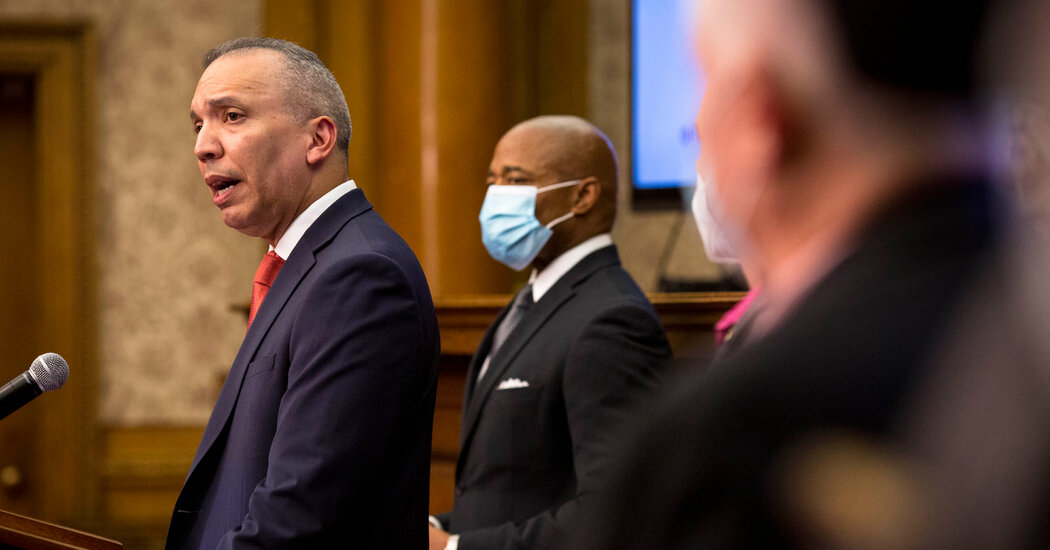Louis Molina, the correction commissioner, responded to a recent New York Times report that found serious injuries to at least two detainees were not reported.
Louis A. Molina, the commissioner of the New York City Department of Correction, was harshly criticized on Tuesday by a jails oversight panel for his agency’s failure to document two brutal beatings that occurred on Rikers Island last year.
During a meeting of the city’s Board of Correction, panel members demanded answers about the incidents, which left one man paralyzed in August and landed another in a coma in December, as well as accountability for reporting breakdowns that mischaracterized one beating and failed to record the other in city records. One board member accused the jail system of a cover-up.
The board also noted that such reporting lapses had happened in the past and took aim at Mr. Molina’s recent statements about a need for better collection of data on incidents in the jail system.
“I’m sure you can improve your data systems, but a data system didn’t fail to provide the necessary information to the medical staff and to the board about those very, very serious injuries,” said Dr. Robert Cohen, a board member. “There were staff of yours who refused, who failed, to let us know that very serious injuries had occurred.
“There wasn’t a data system failure,” Mr. Cohen added, “it was a number of people who took it upon themselves not to report this information and to cover it up.”
The Crisis at Rikers Island
Amid the pandemic and a staffing emergency, New York City’s main jail complex has been embroiled in a continuing crisis.
- What to Know: Rikers has long been characterized by dysfunction and violence, but recently the situation has spun out of control.
- Inside Rikers: Videos obtained by The Times reveal scenes of violence and offer vivid glimpses of the lawlessness that has taken hold.
- Brutal Beatings: One Rikers detainee landed in a coma. Another was paralyzed. Both incidents were hidden from the public.
- Decades of Dysfunction: For years, city officials have presided over shortcuts and blunders that have led to chaos at Rikers.
The criticism followed a report in The New York Times that detailed the beatings of Khaled Eltahan, 41, in August and Jose Matias, 25, in December. Mr. Eltahan was paralyzed from the neck down after another detainee kicked him repeatedly while he was being held in an intake holding pen. Mr. Matias underwent emergency skull surgery to ease swelling of the brain, spent several weeks in a coma and had to relearn how to walk and talk after another detainee threw him to the floor and kicked him on an unguarded jail housing floor.
Responding during the board meeting on Tuesday, Mr. Molina acknowledged the Correction Department’s failures in documenting the incidents and pledged to improve the reporting systems.
“Transparency is very important to me,” said Mr. Molina, who was appointed by Mayor Eric Adams in January. “The incidents described in The New York Times article, which happened under the previous administration, are disturbing, and it is unacceptable, and they were not properly documented or reported.”
Asked whether the Correction Department had disciplined jailers for their failure to report the beatings of Mr. Eltahan and Mr. Matias, Mr. Molina declined to discuss that topic at the meeting.
His handling of the reviews of the two cases will be a test of his willingness to hold jail staff accountable, which was called into question when, while preparing to take over the department, he asked the jails’ top investigator to “get rid” of 2,000 discipline cases pending against jailers.
He later fired her in a move that was cheered by the correction officers’ unions, which had condemned efforts by the past administration to step up discipline cases against guards.
The criticism on Tuesday came as Mr. Molina attempts to lead the jail system out of one of the worst crises it has faced in the past 30 years. Since the coronavirus pandemic swept through New York City, thousands of correction officers have stopped showing up to work. Slashings and stabbings in the jails have risen. Gangs have taken control of some housing areas on Rikers Island, leaving many detainees to fend for themselves, at times without food or access to health care.
Sixteen people died after being held in the jail system last year, the deadliest since 2013, and last month the Correction Department recorded its first death of 2022, when a 38-year-old man, Tarz Youngblood, was found slumped over a toilet and could not be revived.


























